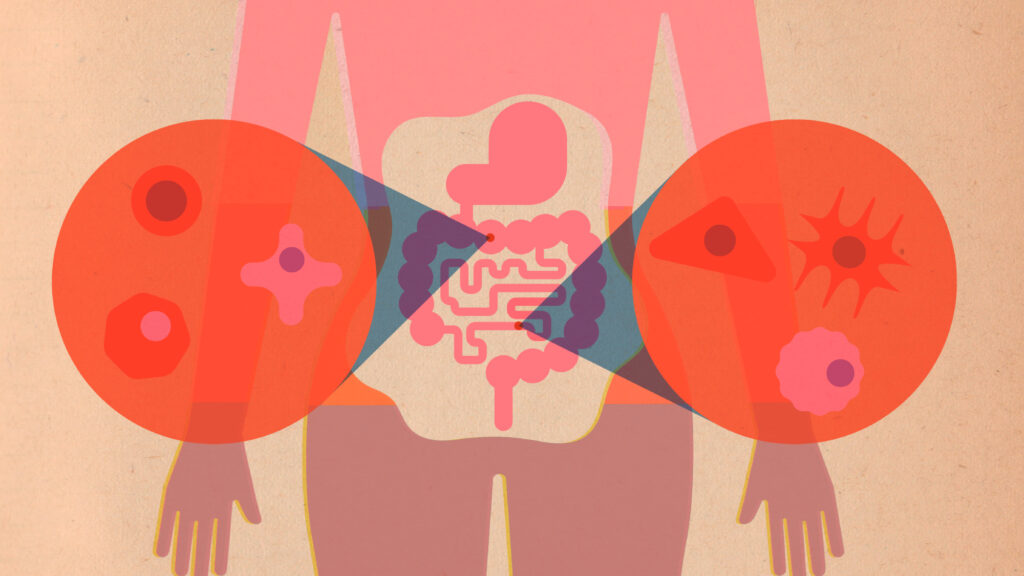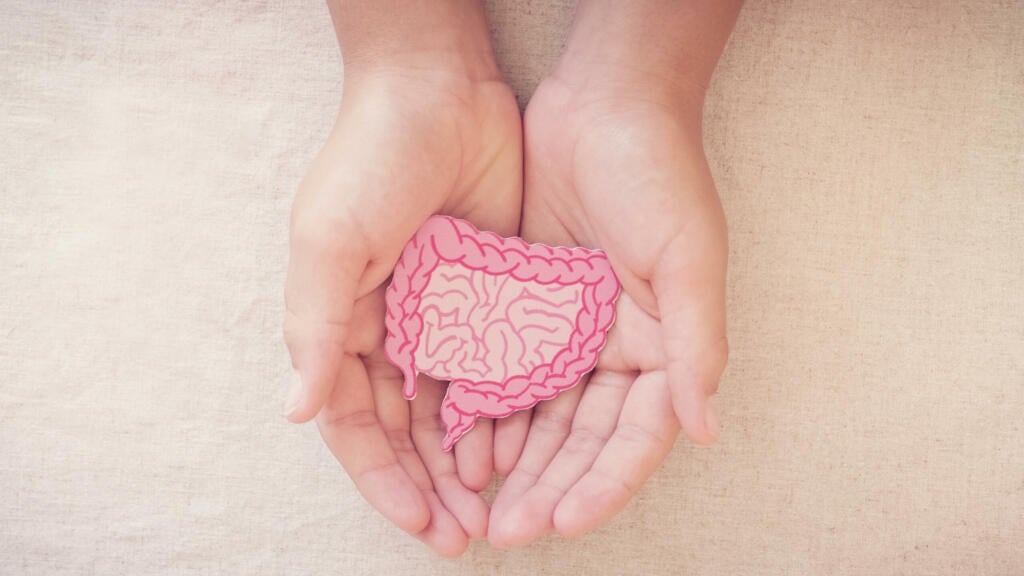
Gut healing foods: 7 surprisingly stomach-friendly treats
Ruth Tierney
We’ve rounded up the best foods for gut health to help you show your digestive system some TLC.
We often find ourselves putting others before ourselves and running around looking after the special people in our lives, which is wonderful. But life doesn’t just have to be about caring for others. Each day presents a fantastic opportunity for self-care and showing yourself some love, more specifically your gut.
One easy way we can do that is through our diet. After all, we need to fuel ourselves properly in order to care for others properly. The foods we eat affect our gut health and this in turn affects our overall health; for example, because a healthy gut helps to regulate your immune system.
We often find ourselves putting others before ourselves and running around looking after the special people in our lives, which is wonderful. But life doesn’t just have to be about caring for others. Each day presents a fantastic opportunity for self-care and showing yourself some love, more specifically your gut.
One easy way we can do that is through our diet. After all, we need to fuel ourselves properly in order to care for others properly. The foods we eat affect our gut health and this in turn affects our overall health; for example, because a healthy gut helps to regulate your immune system.
 Credit: Shutterstock/Monstar Studio
Credit: Shutterstock/Monstar StudioNutritionist, food writer and supporter of the Love Your Gut initiative, Fiona Hunter, says: “We are what we eat.” Imagine you’re a high-performance car, she says – if you put rubbish fuel into it, you’re not going to get good performance.
This is why a healthy balanced diet is so important. Hunter explains that it helps us to live longer but also to stay healthier for longer. While it’s important to make positive choices as early as you can in life, she says: “It’s never too late to make changes to your diet.
“Your digestive system can become a little more sluggish [as you get older],” adds Hunter. “We only have one body, so we’ve got to look after it.”
What counts as the gut?
Hunter says: “What we call gut health starts in your mouth and ends in your anus.” She adds the oesophagus, stomach, small intestine and large intestine, which sit between these points, are all part of the digestive system.
Although specific foods are helpful to ensure a good balance of bacteria in your gut, Hunter emphasises that variety is key. Experts recommend that you eat 30 different plant foods per week. So, we’ve rounded up the best foods for gut health to help you show your body some care every day of the year.
Fiona Hunter has a BSc (Hons) Nutrition and a postgraduate diploma in Dietetics.
She started her career as a dietitian in the NHS; she then joined Good Housekeeping Magazine. Currently, Hunter works as a consultant for food manufacturers, retailers and public relations agencies. Her work has been featured in national newspapers and magazines as well as on TV and radio.
 Credit: Shutterstock/Megan Betteridge
Credit: Shutterstock/Megan BetteridgeFermented foods are sources of food that have had micro-organisms, like bacteria or yeast, added to them. The fermentation process is an ancient technique that was used to preserve foods, before the introduction of refrigeration. These days, fermented foods are recommended because of the health benefits they can provide.
Some fermented foods, such as kombucha and kefir, contain probiotics (beneficial bacteria) which have been proven to restore the balance of bacteria in the gut. This, in turn, can aid digestion.
Other fermented foods that contain probiotics include kimchi, yoghurt, kefir and sauerkraut. While sourdough bread and tempeh are also classed as fermented foods, they are cooked before eating. This process can mean friendly bacteria is lost, which may mean these foods are no longer a source of probiotics. So it’s best to stick with fresh, raw varieties to reap the full benefits.
 Credit: Shutterstock/Stephanie Frey
Credit: Shutterstock/Stephanie FreyThe NHS says that eating more fibre and roughage from a variety of sources can help digestion and prevent constipation. The recommended daily intake is 30g of fibre, but most of us aren’t achieving that. Oats, like other wholegrains, can help you to reach it.
“[Oats are] a very good source of soluble fibre,” explains Hunter. Different types of fibre perform different functions in the bowel. Soluble fibre dissolves in water to form a gel-like substance. This slows down the amount of time it takes for food to travel through the gut, helping us to feel fuller for longer. The gel attracts fluid during digestion, softening stool, helping it to move through the bowel more easily.
Other sources of soluble fibre include apples, citrus fruits, carrots, Brussels sprouts, sweet potato, turnip, aubergine, peas and green beans.
 Credit: Shutterstock/Nopparat Promtha
Credit: Shutterstock/Nopparat PromthaLike oats, chia seeds are an excellent source of soluble fibre, with just two heaped tablespoons (around 28g) containing 10g of dietary fibre.
Fibre isn’t digested in the small intestine, so, as Hunter says: “When fibre reaches the large intestine, the bacteria break down the fibre to produce short-chain fatty acids which are beneficial for our health; [this] generates energy and the body uses that energy to strengthen the wall of the large intestine.”
If you’re new to chia seeds, try adding them to cereal or porridge, or mixed into yogurt, or sprinkled on top of a salad.
 Credit: Shutterstock/Lucigerma
Credit: Shutterstock/LucigermaUnlike chia seeds and oats, asparagus is high in insoluble fibre. “[Insoluble fibre] passes into your large intestine and absorbs water to create a bulk that produces a larger and softer stool. So when you go [for a poo], it’s easier to pass,” explains Hunter.
She recommends the Bristol stool chart as a useful resource for checking stool consistency.
“What we should be aiming for is something that’s quite soft and large and you can pass quite easily, without straining,” she says. “You should have a bowel movement ideally every 24 hours. If you don’t go for more than three days, you’re constipated.”
 Credit: Shutterstock/fizkes
Credit: Shutterstock/fizkesHunter emphasises the importance of staying hydrated for a healthy gut. “If you’re not drinking, the fibre can’t do its job,” she explains.
Instead, your body will absorb fluid from the contents of your large intestine, which can cause your stools to become hard and difficult to pass. What’s more, stools that are sitting around in your large intestine aren’t great for your gut microbes.
To avoid this, aim for around 1.5 litres of fluid per day, but you may need more depending on your circumstances. Why not invest in a measuring water bottle or download a water tracking app to keep tabs on how much you’re drinking?
 Credit: Shutterstock/Victoria Sendra Hueso
Credit: Shutterstock/Victoria Sendra HuesoGarlic has a range of benefits for gut and wider health, including feeding the friendly gut bacteria that are thought to support your immune system. There is also some evidence that it can work against unhelpful changes in gut bacteria that are linked to obesity. Research also suggests that a garlic extract taken for three months increases gut microbe diversity in people with high or raised blood pressure. Some of the research into garlic and gut health has been carried out on mice, so more research based on humans is still needed, including into whether there are any differences in the impact of garlic supplements compared with whole garlic as a food on gut health.
Closely related to garlic is the leek, which Hunter explains provides similar benefits, since they both contain a prebiotic fibre called inulin. Prebiotics are carbohydrates which are not broken down in the body, and which provide food for the friendly bacteria in the gut.
However, if you have irritable bowel syndrome (IBS), you may find that foods in the onion family, like garlic, can worsen symptoms due to being high in fructan. Fructan is a type of fermentable sugar (or FODMAP) which is poorly absorbed in the small intestine. This means it can aggravate the gut and cause symptoms in some people. If you have IBS or a related condition, speak to a dietitian before adding or removing these from your diet.
 Credit: Shutterstock/Rostislav_Sedlacek
Credit: Shutterstock/Rostislav_SedlacekNot only does it taste nice, but this drink has been proven to be beneficial for our gut health. A 2019 study showed people who drank red wine had a wider variety of gut bacteria compared with those who drank other alcoholic drinks. Greater diversity of gut microbes is considered healthier.
The reason is in the grape skins. When red wine is being made, the skins are left in contact with the grape juice whilst it ferments into wine. Grape skin has lots of polyphenols (natural antioxidant compounds found in plants), which feed gut microbes and help them to reproduce.
Overall, alcohol can still damage your health and the NHS recommends drinking no more than 14 units of alcohol per week but if you’re going to drink alcohol, red wine is the gut-friendly choice (along with a glass of water, of course)! Or if you’re celebrating a special occasion with bubbles, pink champagne, like rosé wine (both are produced either by allowing the skins to stay in contact with the grape juice for a short time, or by blending in a small amount of red wine), contains more polyphenols than standard champagne.
A few additions to your diet can make improvements to your health. For more ways to show yourself some love today and all year round, check out these food tips to help you sleep.

Written by Gemma Harris she/her
Published: Updated:
Gemma Harris has been a journalist for over seven years and is a self-confessed health and wellbeing enthusiast, which led her to specialise in health journalism. During her career, she has worked with top editors in the industry and taken on multiple high-discipline fitness challenges for certain outlets. She is particularly passionate about nutrition; after being diagnosed with irritable bowel syndrome in 2016, she discovered her fascination for gut health and founded thegutchoice.com – a dedicated space for providing a hopeful outcome for people with gut issues. Gemma’s core aim is to help others through her writing.

Ruth Tierney

Patsy Westcott

Gemma Harris

Gemma Harris